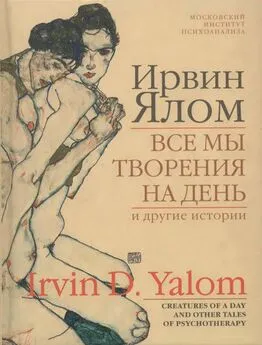Ирвин Ялом - The Schopenhauer Cure
- Название:The Schopenhauer Cure
- Автор:
- Жанр:
- Издательство:неизвестно
- Год:неизвестен
- ISBN:нет данных
- Рейтинг:
- Избранное:Добавить в избранное
-
Отзывы:
-
Ваша оценка:
Ирвин Ялом - The Schopenhauer Cure краткое содержание
The Schopenhauer Cure - читать онлайн бесплатно полную версию (весь текст целиком)
Интервал:
Закладка:
years, he yearned to be out of the classrooms and onto the wards as a clinical clerk, with
white jacket and stethoscope hanging out of pocket or slung casually about his neck like a
steel–and–rubber shawl. Not in the clerkships of his third and fourth medical school years,
when he finally took his place on the wards. There he yearned for more authority—to be
important, to make vital clinical decisions, to save lives, to dress in blue scrubs and
careen a patient on a gurney down the corridor to the OR to perform emergency trauma
surgery. Not even when he became chief resident in psychiatry, peeked behind the curtain
of shamanism, and was stunned at the limits and uncertainty of his chosen profession.
Without doubt Julius`s chronic and persistent unwillingness to grasp the present
had played havoc with his marriage. Though he had loved Miriam from the moment he
laid eyes on her in the tenth grade, he simultaneously resented her as an obstacle blocking
him from the multitude of women he felt entitled to enjoy. He had never completely
acknowledged that his mate–search was over or that his freedom to follow his lust was in
the slightest way curtailed. When his internship began he found that the house staff
sleeping quarters were immediately adjacent to the nursing school dorm brimming with
nubile young nurses who adored doctors. It was a veritable candy store, and he stuffed
himself with a rainbow of flavors.
It was only after Miriam`s death that the reversal must have occurred. In the ten
years since the car crash took her from him, he had cherished her more than while she
was alive. Julius sometimes heaved with despair when he thought of how his lush
contentment with Miriam, the true idyllic soaring moments of life, had come and gone
without his fully grasping them. Even now, after a decade, he could not speak her name
quickly but had to pause after each syllable. He knew also that no other woman would
ever really matter to him. Several women temporarily dispelled his loneliness, but it
didn`t take long for him, and for them, to realize they would never replace Miriam. More
recently, his loneliness was attenuated by a large circle of male friends, several of whom
belonged to his psychiatric support group, and by his two children. For the past few years
he had taken all his vacationsen famille with his two children and five grandchildren.
But all these thoughts and reminiscences had been only nocturnal trailers and short
subjects—the main feature of the night`s mentation had been a rehearsal of the speech he
would deliver to the therapy group later that afternoon.
He had already gone public about his cancer to many of his friends and his
individual therapy patients, yet, curiously, he was painfully preoccupied with his «coming
out» in the group. Julius thought it had something to do with his being in love with his
therapy group. For twenty–five years he had looked forward eagerly to every meeting.
The group was more than a clump of people; it had a life of its own, an enduring
personality. Though none of the original members (except, of course, he himself) was
still in the group, it had a stable persisting self, a core culture (in the jargon, a unique set
of «norms»—unwritten rules) that seemed immortal. No one member could recite the
group norms, but everyone could agree whether a certain piece of behavior was
appropriate or inappropriate.
The group demanded more energy than any other event of his week, and Julius had
labored mightily to keep it afloat. A venerable mercy ship, it had transported a horde of
tormented people into safer, happier harbors. How many? Well, since the average stay
was between two and three years, Julius figured at least a hundred passengers. From time
to time, memories of departed members wafted through his mind, snippets of an
interchange, a fleeting visual image of a face or incident. Sad to think that these wisps of
memory were all that remained of rich vibrant times, of events bursting with so much
life, meaning, and poignancy.
Many years ago Julius had experimented with videotaping the group and playing
back some particularly problematic interchanges at the next meeting. These old tapes
were in an archaic format no longer compatible with contemporary video playback
equipment. Sometimes he fancied retrieving them from his basement storage room,
having them converted, and bringing departed patients back to life again. But he never
did; he couldn`t bear exposing himself to proof of the illusory nature of life, how it was
warehoused on shiny tape and how quickly the present moment and every moment to
come will fade into the nothingness of electromagnetic wavelets.
Groups require time to develop stability and trust. Often a new group will spin off
members who are unable, for reasons of either motivation or ability, to engage in the
group task (that is, interacting with other members and analyzing that interaction). Then
it may go through weeks of uneasy conflict as members jockey for position of power,
centrality, and influence, but eventually, as trust develops, the healing atmosphere grows
in strength. His colleague, Scott, had once likened a therapy group to a bridge built in
battle. Many casualties (that is, dropouts) had to be taken during the early formative
stage, but once the bridge was built it conveyed many people—the remaining original
members and all those who subsequently joined the group—to a better place.
Julius had written professional articles about the various ways that therapy groups
helped patients, but he always had difficulty in finding the language to describe the truly
crucial ingredient: the group`s healing ambience. In one article he likened it to
dermatological treatments of severe skin lesions in which the patient was immersed into
soothing oatmeal baths.
One of the major side benefits of leading a group—a fact never stated in the
professional literature—is that a potent therapy group often heals the therapist as well as
the patients. Though Julius had often experienced personal relief after a meeting, he
never was certain of the precise mechanism. Was it simply a result of forgetting himself
for ninety minutes, or of the altruistic act of therapy, or of enjoying his own expertise,
feeling proud of his abilities, and enjoying the high regard of others? All of the above?
Julius gave up trying to be precise and for the past few years accepted the folksy
explanation of simply dipping into the healing waters of the group.
Going public with his melanoma to his therapy group seemed a momentous act. It
was one thing, he thought, to be open with family, friends, and all the other folks residing
backstage, but quite another to unmask himself to his primary audience, to that select
group for whom he had been healer, doctor, priest, and shaman. It was an irreversible
step, an admission that he was superannuated, a public confession that his life no longer
spiraled upward toward a bigger, brighter future.
Julius had been thinking a good bit of the missing member, Pam, now traveling
and not due to return for a month. He regretted she would not be there today for his
disclosure. For him, she was the key member of the group, always a comforting, healing
presence for others—and for him as well. And he felt chagrined by the fact that the group
had not been able to help with her extreme rage and obsessional thinking about her
husband and an ex–lover and that Pam, in desperation, had sought help at a Buddhist
meditation retreat in India.
And so, heaving and churning with all these feelings, Julius entered the group
room at four–thirty that afternoon. The members were already seated and poring over
sheets of paper which were whisked out of sight when Julius entered.
Odd, he thought. Was he late? He took a quick look at his watch. Nope, four–thirty
on the dot. He put it out of mind and began the recitation of his prepared statement.
«Well, let`s get started. As you know, I never make a practice of starting the
meeting, but today`s an exception because there`s something I need to get off my chest,
something that`s hard for me to say. So here goes.
«About a month ago I learned that I have a serious, I`ll be frank, more than
serious—a life–threatening form of skin cancer, malignant melanoma. I thought I was in
good health; this turned up at a recent routine physical exam....»
Julius stopped. Something was off kilter: The members` facial expression and
nonverbal language weren`t right. Their posture was wrong. They should have been
turned toward him; focusing on him; instead no one fully faced him, no one met his gaze,
all eyes were averted, unfocused, except for Rebecca, who covertly studied the sheet of
paper in her lap.
«What`s happening?» asked Julius. «I feel like I`m not making contact. You all
seem preoccupied with something else today. And, Rebecca, what is it that you`re
reading?»
Rebecca immediately folded the paper, buried it in her purse, and avoided Julius`s
gaze. Everyone sat quietly until Tony broke the silence.
«Well, I gotta talk. I can`t talk for Rebecca but I`ll talk for myself. My problem
when you were speaking was that I already know what you`re going to tell us about
your...health. So it was hard to look at you and pretend I was hearing something new.
And yet I just couldn`t interrupt you to tell you that I knew it already.»
«How? What do you mean you knew what I was going to say? What in hell is
going on today?»
«Julius, I`m sorry, let me explain,” said Gill. «I mean, in a way I`m to blame. After
the last meeting I was still frazzled and not clear about when or whether to go home or
where to sleep that night. I really put pressure on everyone to come to the coffee shop,
where we continued the meeting.»
«Yeah? And?» Julius coaxed, moving his hand in a small circle as though
conducting an orchestra.
«Well, Philip told us what the score was. You know—about your health and about
the malignant myeloma—”
«Melanoma,” Philip softly interjected.
Gill glanced at the paper in his hand. «Right, melanoma. Thanks, Philip. Keep
doing that. I get mixed up.»
«Multiple myeloma is a cancer of the bone,” said Philip. «Melanoma is a cancer of
the skin, think of melanin, pigment, skin coloring—”
«So those sheets are...,” interrupted Julius, gesturing with his hands to invite Gill
or Philip to explain.
«Philip downloaded information about your medical condition and prepared a
summary, which he handed out just as we entered the room a few minutes ago.» Gill
extended his copy toward Julius, who saw the heading: Malignant Melanoma.
Staggered, Julius sat back in his chair. «I...uh...don`t know how to put it...I feel
preempted, I feel like I had a big news story to tell you and I`ve been scooped, scooped
on my own life story—or death story.» Turning and speaking directly to Philip, Julius
said, «Had you any guesses about how I`d feel about that?»
Philip remained impassive, neither replying nor looking at Julius.
«That`s not entirely fair, Julius,” said Rebecca, who removed her barrette, loosened
her long black hair, and twisted it into a coil on the top of her head. «He`s not at fault
Читать дальшеИнтервал:
Закладка:









